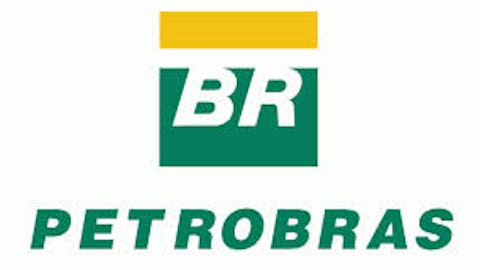When thinking of emerging market investments, Brazilian oil giant Petroleo Brasileiro Petrobras SA (ADR) (NYSE:PBR) frequently comes to mind. With a $67 billion market cap, exciting deepwater prospects off the Brazilian coast, a PE of around 12 and a 6.6% dividend, Petroleo Brasileiro Petrobras SA (ADR) (NYSE:PBR) at first blush seems like an ideal investment.
Unfortunately, the Brazilian government owns a controlling stake and government interests don’t always align with those of foreign investors. Production is down for both oil and natural gas, which helps explain why the stock currently trades near its three-year lows. Turns out, there are other emerging market companies besides Petroleo Brasileiro Petrobras SA (ADR) (NYSE:PBR) worth a look, let’s look at three.
An even bigger South American oil company
Ecopetrol S.A. (ADR) (NYSE:EC) of Colombia offers investors another government-controlled oil company. With a $90 billion market cap and 6.5% dividend, Ecopetrol S.A. (ADR) (NYSE:EC) rivals Petrobras in size and yield. Last quarter production increased but earnings declined due to lower oil prices. This latest earnings report continues a trend of lower than expected earnings over successive quarters. The declining earnings are not for lack of trying. Ecopetrol S.A. (ADR) (NYSE:EC) will spend money upgrading its refineries and pipelines and plans on expanding its exploration activities in the Gulf of Mexico.
Ecopetrol faces significant obstacles. On the business side, oil prices continue to slowly decline, further pressuring earnings. Of late, Ecopetrol has made no major oil discoveries and its price per proven reserves makes the company more expensive than ExxonMobil or Petrobras. On the political side, the Colombian terrorist organization FARC (Revolutionary Armed Forces of Colombia) and the Colombian government talk peace in Havana. However in Colombia, Ecopetrol S.A. (ADR) (NYSE:EC) experiences problems with FARC blowing up its pipelines.
All of these headaches have pushed the price of Ecopetrol S.A. (ADR) (NYSE:EC) from around $63 to $43 in three months. Minister of Finance Mauricio Cardenas recommends the stock, but what else can he say? I say avoid this company until the stock hits a floor or FARC grows up and leaves Ecopetrol alone.
LATAM Airlines Group SA (ADR) (NYSE:LFL), the merger of LAN airlines of Chile and TAM airlines of Brazil last summer, offers domestic and international passenger air travel from South America to domestic and international destinations. Through subsidiaries, LATAM Airlines Group SA (ADR) (NYSE:LFL) offers airfreight services from Mexico, Brazil and Colombia to 27 different countries. In terms of revenue, passenger traffic generates the lion’s share of the company’s income.
The latest quarter saw increases in operating income, passenger traffic from both Brazil and Spanish-speaking countries. Total revenues increased 1.5% and synergies of the merger continue to unfold. Looking ahead to the World Cup in 2014 and the Summer Olympics in 2016, LATAM Airlines Group SA (ADR) (NYSE:LFL) should do well. Unfortunately, earnings declined by about 50% and that overshadowed the good news.
The earnings decline came from multiple causes, including a 13% weakening of the Brazilian real versus the US dollar, losses stemming from the grounding of its three Dreamliners, and a weak European market. The Brazilian cargo market also showed weakness and LATAM Airlines Group SA (ADR) (NYSE:LFL) faces competition from international carriers.
While the merger should do well in time, the stock is getting whacked of late, down from $29 per share a little more than a year ago to around $19 today. The planned issuance of another $1 billion in common stock didn’t help the stock price either. This company should grow with the South American economy, but will require patience.
Operating airports where the tourists go
Mexican airport operator Grupo Aeroportuario del Sureste (ADR) (NYSE:ASR) operates airports in such popular tourist attractions as Cancun and Cozumel. All told, Grupo Aeroportuario del Sureste (ADR) (NYSE:ASR) operates nine airports in southeastern Mexico, a strategic location to Central America located in the heart of coffee-growing country. The active exploration for gold in nearby Vera Cruz doesn’t hurt, either.
The company’s airports handle both passenger and cargo air traffic as well as airport concessions. More recently, Grupo Aeroportuario del Sureste (ADR) (NYSE:ASR) won approval from the US FAA to operate the airport in San Juan, Puerto Rico through its Aerostar joint venture. The San Juan airport looks like a three to four year project with the company projecting a cap ex of $250 million for planned upgrades.
The company’s fundamentals look pretty good. Grupo Aeroportuario del Sureste (ADR) (NYSE:ASR) carries little debt, enjoys an operating profit margin just over 38%, and pays a dividend of 2.4%. Recent earnings declined despite increased traffic and revenues. The company blames increased taxes, losses connected to the San Juan airport bid, and devaluation of the peso relative to the US dollar. The stock trades at just under $116 per share, down from $141 in mid April.
Final Foolish thoughts
Of the three companies here, I like the Mexican airport firm Grupo Aeroportuario del Sureste (ADR) (NYSE:ASR) best. The underlying business seems best positioned to rebound from recent earnings setbacks. Latam would be my next choice with synergies from the corporate merger likely to grow. Again, patience will be required. Ecopetrol needs some political stability at home before I can invest with them.
The article 3 Latin American Companies Worth a Look originally appeared on Fool.com and is written by Robert Zimmerman.
Robert Zimmerman has no position in any stocks mentioned. The Motley Fool recommends Grupo Aeroportuario del Sureste (ADR) and Petroleo Brasileiro (NYSE:PBR) S.A. (ADR). Robert is a member of The Motley Fool Blog Network — entries represent the personal opinion of the blogger and are not formally edited.
Copyright © 1995 – 2013 The Motley Fool, LLC. All rights reserved. The Motley Fool has a disclosure policy.




